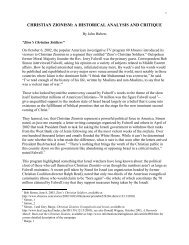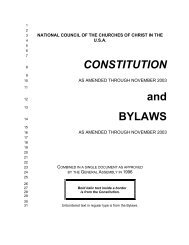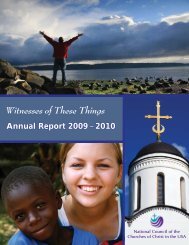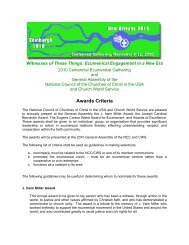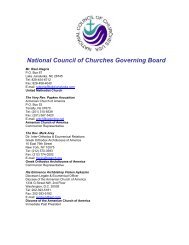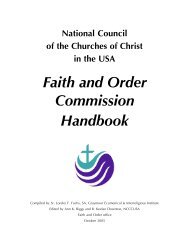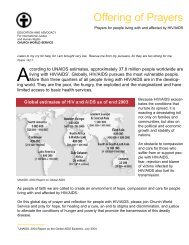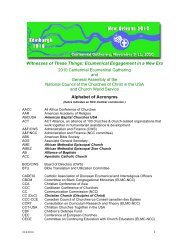Common Agreement on Mutual Recognition of Baptism - National ...
Common Agreement on Mutual Recognition of Baptism - National ...
Common Agreement on Mutual Recognition of Baptism - National ...
You also want an ePaper? Increase the reach of your titles
YUMPU automatically turns print PDFs into web optimized ePapers that Google loves.
542<br />
543<br />
544<br />
545<br />
546<br />
547<br />
548<br />
549<br />
550<br />
551<br />
552<br />
553<br />
554<br />
555<br />
556<br />
557<br />
558<br />
559<br />
560<br />
561<br />
562<br />
563<br />
564<br />
565<br />
566<br />
567<br />
568<br />
569<br />
570<br />
571<br />
572<br />
573<br />
574<br />
575<br />
576<br />
577<br />
578<br />
579<br />
580<br />
581<br />
582<br />
583<br />
584<br />
585<br />
586<br />
3.b.<br />
ii A Reformed View<br />
The Reformed traditi<strong>on</strong> historically argued at the time <strong>of</strong> the Protestant Reformati<strong>on</strong>, and<br />
still theologically maintains, that worship ought to be d<strong>on</strong>e according to scripture. For some <strong>of</strong><br />
the traditi<strong>on</strong>, <strong>on</strong>ly those practices could be d<strong>on</strong>e that scripture warranted:<br />
But the acceptable way <strong>of</strong> worshipping the true God is instituted by himself, and<br />
so limited by his own revealed will, that he may not be worshipped according to<br />
the imaginati<strong>on</strong>s and devices <strong>of</strong> men, or the suggesti<strong>on</strong>s <strong>of</strong> Satan, under any<br />
visible representati<strong>on</strong> or any other way not prescribed in the Holy Scripture.<br />
(Westminster C<strong>on</strong>fessi<strong>on</strong> XXIII)<br />
For other parts <strong>of</strong> the traditi<strong>on</strong>, rites not prescribed by scripture could still be celebrated for our<br />
benefit so l<strong>on</strong>g as they did not go against scripture. As the Sec<strong>on</strong>d Helvetic C<strong>on</strong>fessi<strong>on</strong><br />
pastorally puts the matter, ―a few moderate and simple rites, that are not c<strong>on</strong>trary to the Word <strong>of</strong><br />
God, are sufficient for the godly‖ (XXVII).<br />
The Reformed traditi<strong>on</strong> thus counts the dominically instituted sacraments as two, baptism<br />
and the Lord‘s Supper (e.g., Scots C<strong>on</strong>fessi<strong>on</strong> XXI; Heidelberg Catechism Q. 68; Sec<strong>on</strong>d<br />
Helvetic C<strong>on</strong>fessi<strong>on</strong> XIX; Belgic C<strong>on</strong>fessi<strong>on</strong>, art. 34; Westminster C<strong>on</strong>fessi<strong>on</strong> XXVII). To these<br />
sacraments the Reformed traditi<strong>on</strong> applies the l<strong>on</strong>g-standing hermeneutic <strong>of</strong> signum-res to<br />
explain what a sacrament is. To the outer sign God attaches an inner reality; and the Reformed<br />
traditi<strong>on</strong> typically understands that the inner reality that inheres to the sign is ultimately Christ<br />
himself (e.g., Tetrapolitan C<strong>on</strong>fessi<strong>on</strong>, XVII-XVIII; First Basel C<strong>on</strong>fessi<strong>on</strong>, VI; Sec<strong>on</strong>d Basel<br />
C<strong>on</strong>fessi<strong>on</strong> (First Helvetic C<strong>on</strong>fessi<strong>on</strong>), 20 and 22 (Supper); Scots C<strong>on</strong>fessi<strong>on</strong> XXI; Sec<strong>on</strong>d<br />
Helvetic C<strong>on</strong>fessi<strong>on</strong> XIX; French C<strong>on</strong>fessi<strong>on</strong>, XXXIV-XXXVI; Belgic C<strong>on</strong>fessi<strong>on</strong>, art. 33). As<br />
the Sec<strong>on</strong>d Helvetic C<strong>on</strong>fessi<strong>on</strong> says,<br />
the principle thing which God promises in all sacraments and to which all the<br />
godly in all ages direct their attenti<strong>on</strong> (some call it the substance [substantiam]<br />
and matter [materiam] <strong>of</strong> the sacraments) is Christ the Savior (XIX).<br />
Some Reformed voices express the object signified with a proximate descripti<strong>on</strong>, such as<br />
―holy signs and seals <strong>of</strong> the covenant <strong>of</strong> grace, immediately instituted by God, to represent Christ<br />
and his benefits, and to c<strong>on</strong>firm our interest in him‖ (Westminster C<strong>on</strong>fessi<strong>on</strong> XXVII). When<br />
<strong>on</strong>e reaches the actual discussi<strong>on</strong> <strong>of</strong> baptism and Supper, however, <strong>on</strong>e typically finds there the<br />
descripti<strong>on</strong> <strong>of</strong> a pers<strong>on</strong>‘s baptismal ―ingrafting in Christ (Westminster C<strong>on</strong>fessi<strong>on</strong> XXVIII.1), or<br />
that in the Supper ―really and indeed . . . receive and feed up<strong>on</strong> Christ crucified, and all the<br />
benefits <strong>of</strong> his death‖(Westminster C<strong>on</strong>fessi<strong>on</strong> , XXIX.7).<br />
Reformed theology distinguishes between the validity and the efficacy <strong>of</strong> the sacraments.<br />
The sacraments are to be administered by duly ordained ministers <strong>of</strong> the church (e.g., Scots<br />
C<strong>on</strong>fessi<strong>on</strong> XXII; Sec<strong>on</strong>d Helvetic C<strong>on</strong>fessi<strong>on</strong> XVIII, XIX; Large Catechism, Q. 169), and when<br />
so administered, with the proper sign and divine promise <strong>of</strong> grace, as the church intenti<strong>on</strong>ally<br />
follows the mandate <strong>of</strong> scripture, the sacrament validly <strong>of</strong>fers what the sign signifies:<br />
14



